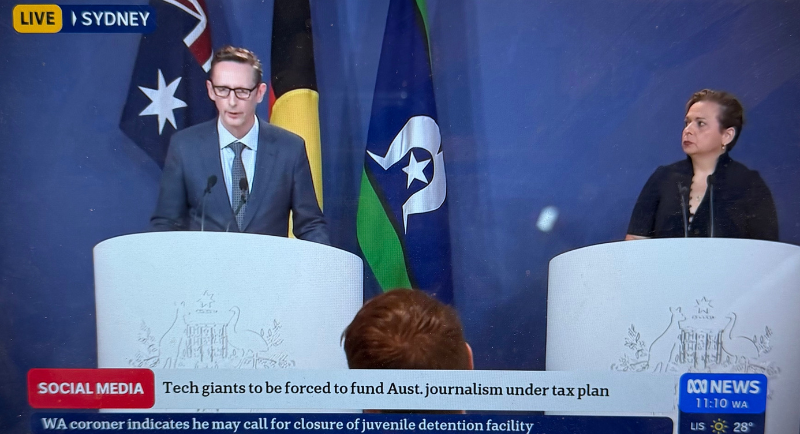Google has raised concerns about the Australian Government’s proposed targeted tax on technology companies, cautioning it could jeopardise the viability of its existing commercial deals with local news publishers.
The response comes after the Albanese Government announced plans on Thursday to force big tech companies to pay for Australian journalism through the News Bargaining Initiative. In a press conference, Assistant Treasurer Stephen Jones emphasised the government’s commitment to ensuring a robust and independent news media sector.
“Today, we announce measures to strengthen that code. The News Bargaining Initiative will be a new addition to that code, which will create a financial incentive for agreement-making between digital platforms and news media businesses in Australia,” Jones said.
The initiative introduces a charge on relevant platforms based on Australian-sourced revenue. “The charge will include a generous offset for the commercial agreements that are voluntarily entered into between the platforms and news media businesses,” Jones added. Platforms in scope include significant social media platforms and search engines generating more than $250 million in Australian revenue annually.

Stephen Jones and Michelle Rowland.
Google’s Position
In a statement, a Google spokesperson emphasised the company’s role as the sole major technology firm in Australia with extensive financial agreements supporting public interest journalism.
“Google has continually demonstrated strong support for public interest journalism as the only technology company with an extensive number of significant commercial agreements with Australian publishers,” the spokesperson said. “Since 2021, we’ve had agreements with over 80 Australian news companies representing 218 outlets. We’ve publicly committed to renewing those deals as they expire, and the earliest have already been renewed.”
Google warned that the proposed tax could disrupt its long-standing partnerships with publishers. “The Government’s introduction of a targeted tax risks the ongoing viability of commercial deals with news publishers in Australia,” the spokesperson said, adding that the company is reviewing the announcement and its potential impact.
A changing media landscape
Google pointed to the rise of alternative platforms like Snapchat, Microsoft, and Apple as increasingly dominant sources of news for Australians. This trend was highlighted by findings from the Digital News Report Australia 2024, which revealed that nearly half (49%) of Australians access news via social media—a 4% increase from the previous year. Among Gen Z, the reliance on social platforms for news has surged by 17% in the same period.
The report highlighted the growing maturity of news consumption on platforms like TikTok and Instagram Reels, cementing short-form video as a key format for younger audiences.
Industry contributions
Google stressed its ongoing commitment to the Australian news industry, pointing to the renewal of its earliest agreements with publishers such as Country Press Australia, Solstice Media, Times News Group, and others. These deals include partnerships with regional and independent outlets, ensuring that diverse voices are supported across the media landscape.
However, the tech giant expressed concerns that the proposed tax could undermine these efforts. “The Government’s introduction of a targeted tax risks the ongoing viability of commercial deals with news publishers in Australia,” the spokesperson said, adding that Google is reviewing the announcement and assessing its implications.
The statement also questioned the lack of similar agreements by other major platforms, particularly Microsoft, which has publicly supported Australia’s News Media Bargaining Code but has not yet reached any deals with Australian publishers.
Meta also hit back at the initiative, telling Mediaweek: “The proposal fails to account for the realities of how our platforms work, specifically that most people don’t come to our platforms for news content and that news publishers voluntarily choose to post content on our platforms because they receive value from doing so.”
Despite its ownership of LinkedIn—a platform heavily reliant on Australian news content—Microsoft appears to be exempt from the proposed tax. This discrepancy, Google argues, raises questions about the fairness and effectiveness of the new measure.
